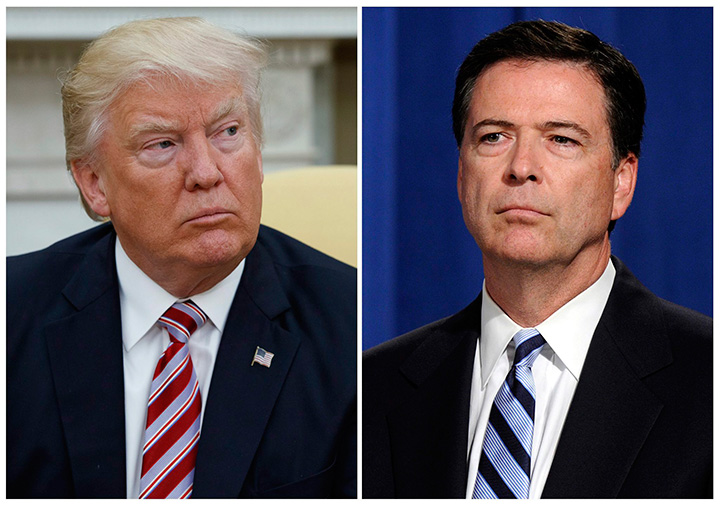After a day of testimony about his relationship with U.S. President Donald Trump, former FBI director James Comey left the world with one burning question: who do you believe?

He didn’t expressly say it – but his tone, candour and confidence set the stage for a battle that is now just as much about perception, as it is wrapped up in the multiple ongoing investigations into alleged ties between the Trump campaign and Russia.
Under oath, Comey made it clear he believes he was fired because of the Russia investigation.
Competing realities: What James Comey said vs. what Donald Trump has said
“I was fired in some way to change the way the Russia investigation was being conducted, that is a very big deal,” he told the Senate Intelligence Committee on Thursday.
He offered great detail of several conversations with the president, in which he claims Trump asked for loyalty and later asked him to let former National Security Adviser Michael Flynn off the hook, in the FBI’s ongoing investigation.
In legal and political circles, those words have stirred debate about whether President Trump’s actions constitute obstruction of justice.
Famed trial lawyer Alan Dershowitz argues that while ethically questionable, there’s no legal case because the president has the constitutional authority to direct the head of the FBI to stop any investigation.
Norman Eisen, the former Obama White House ethics czar, laid out the case for obstruction of justice in the New York Times arguing Comey’s testimony that Trump told him “I hope you can see your way clear to letting this go, to letting Flynn go” proves corrupt intent, to “shut down an investigation to benefit a friend.” But even Eisen cautions we’re a long way from definitively answering the obstruction of justice question.
While we wait, one thing is undoubtedly certain: the president is in serious peril, driven in large part by his public handling of the Russia probe.
Friday morning offered yet another example, as Trump delivered his assessment of Comey’s testimony in a 6:10 a.m. tweet: “Despite so many false statements and lies, total and complete vindication…and WOW, Comey is a leaker!” he wrote.
By disputing what Comey said under oath, the president has all but invited his foes to demand he personally testify under oath to share his version of events.
More so, the tweet is a self-defeating statement. If “so many” of Comey’s statements are “false” and “lies,” as Trump claims, how could they offer the president “total and complete vindication?”
In response to those “false” statements, the White House threatened to file a complaint with the Department of Justice over Comey’s decision to leak memos documenting his conversations with Trump. Numerous experts have pointed out that this is essentially pointless because the memos were not classified and Comey had already been fired when he released them. In other words, the White House is going through a lot of trouble, over statements the president has already dismissed as “lies.”
Comey has also carefully built the case that he had the right to release his conversations.
He testified he released his personal notes in response to a May 12 tweet from the president when Trump wrote “James Comey better hope that there are no ‘tapes’ of our conversations before he starts leaking to the press!”
READ MORE: Comey said Trump lied about reasons for his firing, defamed him
Even if you ignore the fact that the White House still won’t say if the president has a secret taping system, the problem is that Trump originally opened the door to discussion of those conversations, in his letter terminating the FBI director.
In the May 9 letter, Trump writes “I greatly appreciate you informing me, on three separate occasions that I am not under investigation.”
While the Trump administration is thrilled that Comey backed up that version of events in his written and spoken testimony, Comey also added plenty of material that is damaging to the president.
Worse for the White House, the former FBI director has written notes of conversations, which he has turned over to special counsel Robert Muller’s ongoing investigation. Comey has suggested he has friends who will verify his version of events and, unlike Trump, he has now spoken about all of this under oath.
While the former FBI director is by no means free from criticism, the takeaway is that he has meticulously built a road map for investigators to follow.
So far, Trump’s response to that carefully-crafted paper trail has been to cherry-pick the parts of Comey’s testimony he likes, while dismissing the rest.
The president’s personal lawyer tried to suggest malicious intent on the part of Comey by telling reporters Comey had leaked his memos to the New York Times before the president’s tweet – but that timeline was proven inaccurate.
All of this leaves the White House without a basic blueprint for responding to the Comey allegations.
WATCH: Lindsey Graham: Half of what Trump does is not OK, but it’s not a crime

Are there tapes to prove who said what? Are Comey’s statements just lies? Did Comey vindicate Trump? Is Comey a leaker? The administration is dragging the story in a million conflicting directions.
The simplest explanation so far seems to have come from the Speaker of the House of Representatives, Republican Paul Ryan.
“The president’s new at this. He’s new to government,” Ryan told reporters on Thursday, suggesting Trump simply didn’t know that his conversations with Comey were inappropriate.
That’s bound to leave Trump’s critics unsatisfied and his backers very worried about what the president will say next.
For as much as Comey has tried to lay out a clear case for his version of events, the president seems to be offering up plenty of material to investigators, whether intentional or not.











Comments